Bicycle Tour around Lake Volta
Ghana is green, hot, loud and praises the Lord
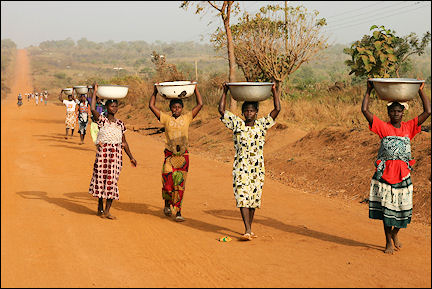
|
A 2000 km bicycle tour around Lake Volta. From the green, relatively wealthy south of Ghana to the poverty in the north and along the west bank of the lake back to the coast. People are friendly everywhere and are eager to show how they live and work. Ghana is a warm country, literally as well as figuratively. The work is mostly done by women, who carry heavy loads on their heads, while the men sit on benches.
Travelogue & photos: Gerrie & Aart Dijkzeul
"You're welcome," is what we hear regularly as a greeting in the five weeks in which we bicycle approximately 2000 km around Lake Volta. And we feel very welcome in Ghana, where Christianity is everywhere.
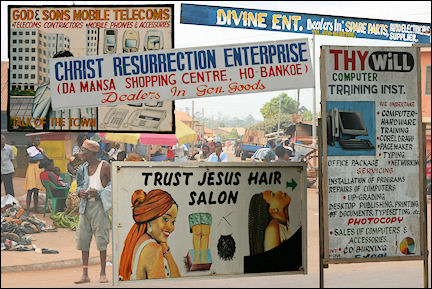
|
The missionaries haven't been sitting on their butts in this country. Denominations abound: Mormons, Pentecostals, a lot of praise-and-healing groups and of course the traditional Catholics and Protestants.
The religious fervor shows even in the names of stores: God and Sons Mobile Telecoms, Trust Jesus Tailor Shop, The Finger of Jesus Furniture.
Upon arrival in Accra, the capital, there is the usual spectacle at the airport: five, six people who want to make some money, accost us. They want to carry our bags, show the way to the taxicabs, tell people to get out of the way. Fortunately, we booked transportation in advance.
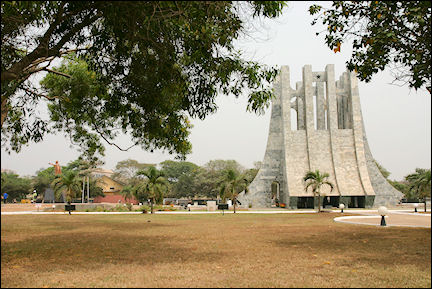
|
The hotel owner, a Lebanese guy, knows Holland fairly well. He visits there regularly to buy old cars (vans). He loads them up with all kinds of stuff and ships them to Benin, where the Dutch hand-me-downs get a second life.
On our first night, we are made aware that Ghanese love music. The huge speakers at the next-door bar make the springs in our mattrass resonate.
Accra - Atimpoku - Amedzofe
On bad roads between green hills to the barrage
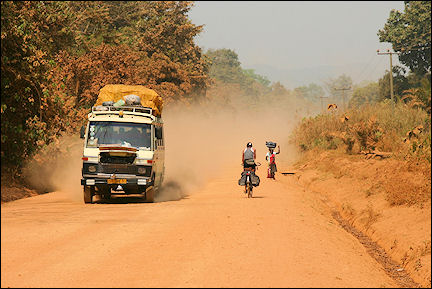
|
The first part of the journey is to get out of Accra. It's hot, it's humid, it's crowded, it's dusty. We're not in vacation mood yet. After 60 km we stop at a lodge and wash ourselves with water from jerrycans, it's not great, but it rinses off the dust of our trip.
Over the next couple of days, it gets better. We only bicycle short distances and the roads get quieter as we get farther away from Accra. The surroundings are beautiful: everything is green, shrubs are blossoming and best of all, there are many butterflies.
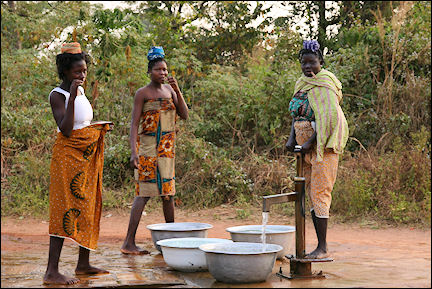
|
We spend the second night in Atimpoku, near the Akosombo barrage, which turns the Volta river into Lake Volta and which supplies the energy for an electricity plant. It's a wonderful place to stay. After our arrival we cool down by taking a swim in the Volta river.
Our cabin is next to a church, in which on New Year's Eve the glory of the Lord is sung from 9 PM to 0:30 AM. Accompanied by bongos and other percussion instruments and alternated with extatic confessions of faith. If only they'd sing in tune...
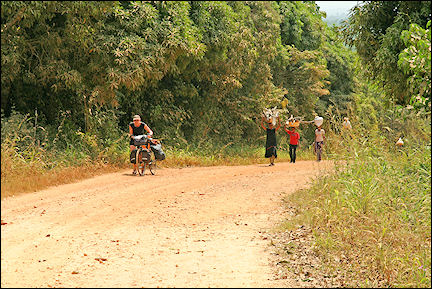
|
Via Amedzofe and Ho we bicycle east of Lake Volta northward to Hohoe in three days. We cross hills up to 800 m high.
On New Year's day there is a ritual going on in one of the villages. We stop and are invited to come and watch. The best hunter of last year is honored with a dance by beautifully dressed men. Bacchus is honored as well, with huge quantities of home-brewed beer.
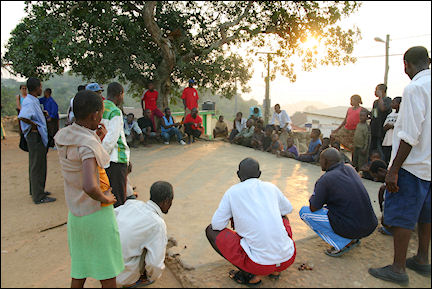
|
The stories about the animals this hunter has killed (among others, elephants), don't sound very credible to us. The dead goat and chicken which are shown proudly, don't help to convince us that the best hunter actually did anything impressive.
The bike trip to Amedzofe is difficult. A lot of climbing and a bad, unpaved road. We alternate bicycling with walking. But we are amply rewarded. A gorgeous guesthouse at Ghana's highest spot (around 870 m), with a view of the valley, even though it's hazy because of the humidity.
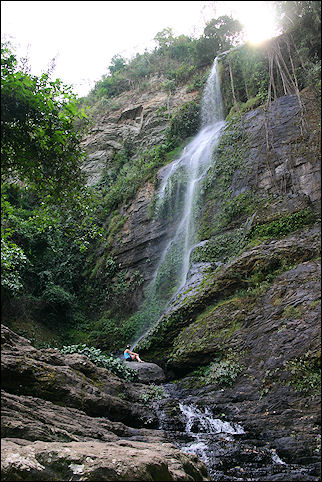
|
We explore the village, it has a former German mission post with a big training center for teachers. In the market place people are playing marbles. Two groups of each four people try fanatically to push the other party's nuts from a smooth 3x5 m surface. A Ghanese version of Jeu de Boules. Noise, yelling, a large audience. It takes hours.
From Amedzofe we walk to the waterfall, three quarters of an hour on a lushly overgrown path. A steep descend and we're there. Not much water, but it's charming.
We resist the temptation to swim in the pools through which the water flows. On the way we saw a large group of women carrying laundry on their heads, on their way to the top of the waterfall. And swimming in Ghanese laundry water is a bridge too far for us.
Amedzofe - Ho - Hohoe - Tamale
Round mud huts with roofs of dried grass
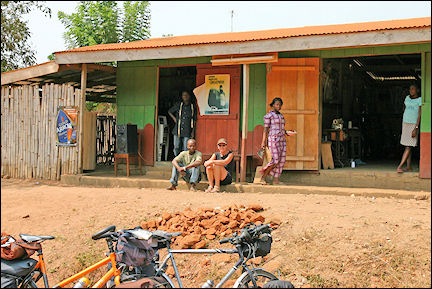
|
The stages to Ho and Hohoe are pieces of cake: good roads and a lot of descending. That will change over the next couple of days. From Hohoe to Tamale is 400 km, of which a large part on unpaved roads.
There are different degrees of unpaved, but this is really bad. A road like a washboard, on which bicycling is impossible. The roadsides are fine grit or sand. We have to steer a middle course between the washboard and the sandbox.
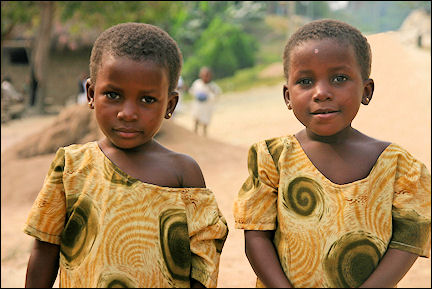
|
We perform a traditional dance of joy when we feel asphalt beneath our tires, some 8 km before our destination. But it's not just misery, there is a lot to enjoy as well. The average day looks like this:
When the alarm clock rings at 5 AM, it's still dark. We have to leave early, because of the heat in the afternoon. We have breakfast with bread and some boiled eggs we bought on the market yesterday. We have hot water for coffee in a thermos from the guesthouse. As soon as it's light, around 6 AM, we get on our bikes. At the same time, the village life also begins.
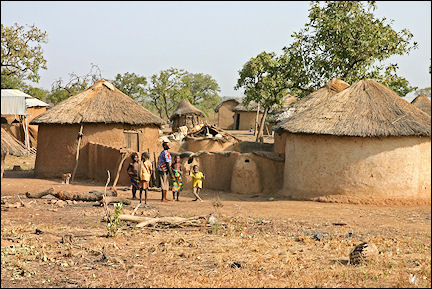
|
Families live in three to six round mud huts with dried-grass roofs, connected by a mud wall, which creates a courtyard. Fires are made and the men warm their hands.
Women don't get cold hands, because they're working. Making breakfast or fetching water at the pump or the river. Women and girls carry water in aluminum tubs on their heads, often over long distances.
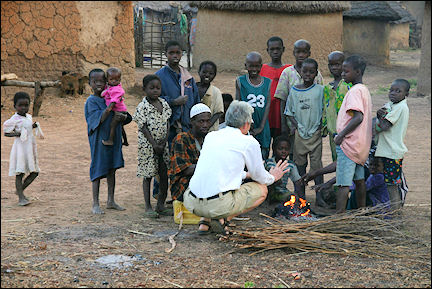
|
Whenever we pass a village, it looks as if school is just over. Children run to the side of the road to wave at us. They yell: "obronie" in some places, in other places they call "faduh". We don't know what they're saying exactly, and neither what it means. Stranger? Crazy people? We can't exclude anything.
When we ask someone who speaks English fairly well, he tells us that "obronie" means "white person" and what we hear as "faduh" is the English word "father". It dates from times when white missionaries brought presents.
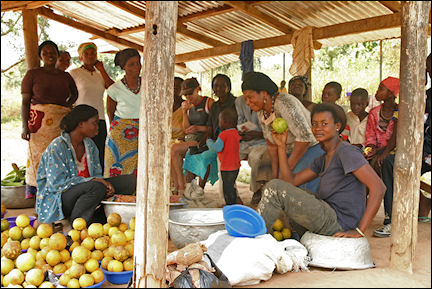
|
We stop at a stall where oranges are sold. There also is a bus stop ("tro tro"). Six juicy oranges are peeled for us.
When we ask if we can take a picture, we almost have a riot on our hands. Everyone wants to be in it: gramps and the baby are brought from a hut, a fat woman positions herself directly in front of the camera. Eventually, all goes well and everyone screams when they see the result on the camera's display.
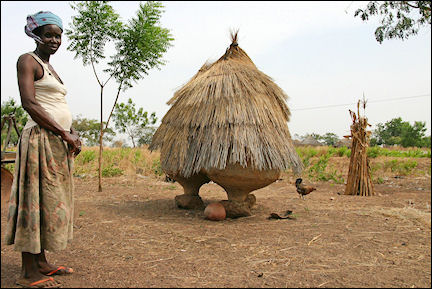
|
It's almost impossible to take pictures without people in them. As soon as we get off our bikes, we are surrounded by kids and adults who, when the camera appears, pose for a picture.
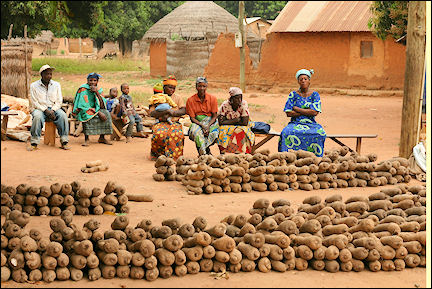
|
Of all the goods we see being transported along the road, wood and cassave are most often carried. Almost everything is carried on heads. No horses, no donkeys, no carts in sight. Women and children carry everything. Sometimes loads are carried on the back of a bicycle.
It's fun to see how those small loads of 6-8 cassaves eventually add up to big stacks on a regional market.
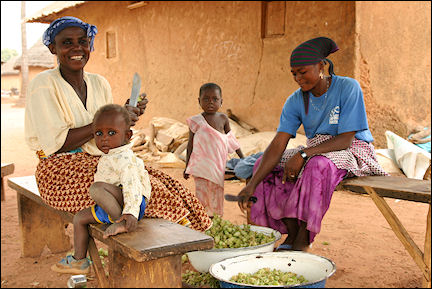
|
We have lunch out of sight, to keep everyone from ogling our bread with banana. This is our average lunch: bread with jam, covered with banana. On the way there is no opportunity to buy food or drink, at least nothing that our stomachs would tolerate.
The area in which we bicycle, changes slowly. The lush tropical green is replaced by rather dry savannah.
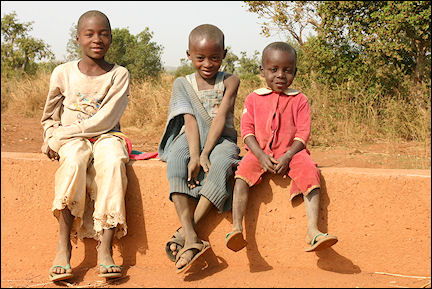
|
Only small pieces of land near villages are cultivated, the largest part of the land is not in use. Sometimes the savannah grass is burned down. In one place, the fire is followed by a large group of boys, who use machetes (brand: Crocodile) to knock out rats or animals that look like rats.
It's unclear if this is for fun or for food.
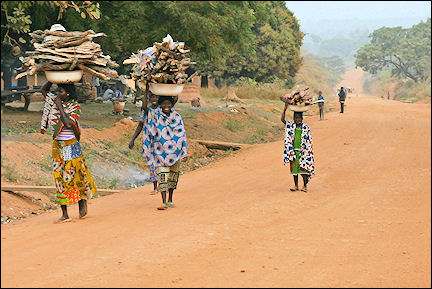
|
The villages along the two last stretches have no electricity. Everything here looks much poorer than what we saw during the first week: grimy clothes, stalls that hardly have anything for sale, dirty water which is all they have and which therefore is used.
As the temperature increases, so does the sensitivity of our butts. Gerrie's could pass for steak. We clearly aren't used to riding on these unpaved roads. Between 2 and 3 PM, we arrive at the destination of the day.
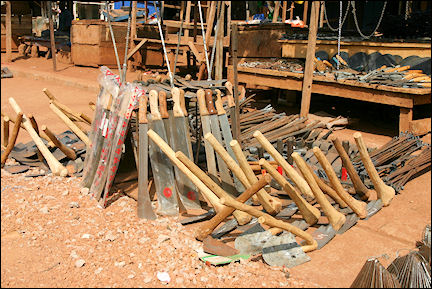
|
Often this is a bigger town with accomodation, like a "hotel" or a guesthouse. We are tired, covered in red dust and thirsty. It's wonderful to take a shower and have a beer (Aart) or Fanta with beer (Gerrie). One of the things they do right here: the bottles Star Beer hold 0.63 liter.
After five stages we arrive in Tamale, a big city. Wide, smoothly asphalted roads, which even have bike paths, street lights and billboards with ads for wireless internet.
In Tamale we spend our time reading and walking or biking in the city.
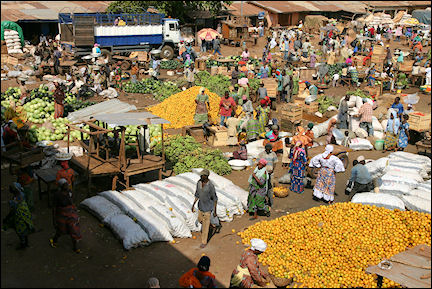
|
We visit the fruit market, where incredibly huge stacks of bananas, oranges and watermelons are sold, the wood market, where wood and charcoal are sold and a market where the merchandise is locally produced tools.
Tamale - Buipe
With the desert wind in our backs we cross the savannah
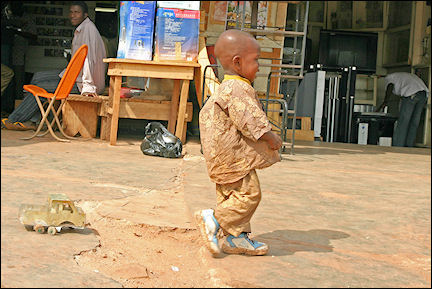
|
Invigorated and with less painfull butts, we continue our tour. Tamale is the most northern place of this journey, from here we go back south along the west side of Lake Volta. With the Harmattan, the desert wind from the Sahara, in our backs.
It's still early when we get on our bikes again. The stage from Tamale to Buipe is a long ride: approximately 110 km. On the way there isn't much, so we have loaded our bicycles with filtered water and bananas.
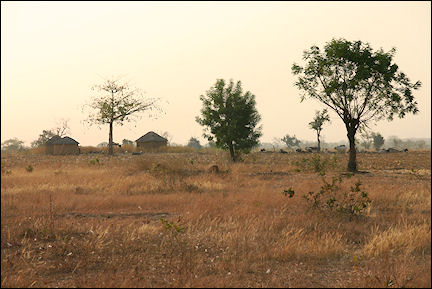
|
Most of the way is rather tedious: savannah and more savannah. By the end it gets a little greener. Or it could be the mist through which we see everything. When we arrive around 12:30 PM, we're exhausted. We leave our stuff in a guesthouse and go out for a bite in a chop bar.
A chop bar is a small shed (1.5 square meters) with a window where one can order food. Usually people take it with them in plastic bags, but we eat our rice and chicken in front of the neighboring store, which has a bench.
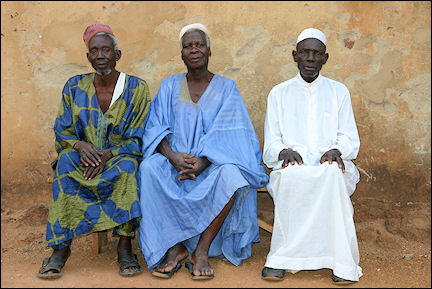
|
It turns out to be a lot harder to find food in the evening in this hamlet. Nothing is open, except a bar, a grand name for a fenced-in sandbox with rickety tables and chairs. When we order beer and Fanta, they nod.
A little later we see the daughter run off with some money in her hand; she returns ten minutes later with the drinks we ordered - wonderfully cold.
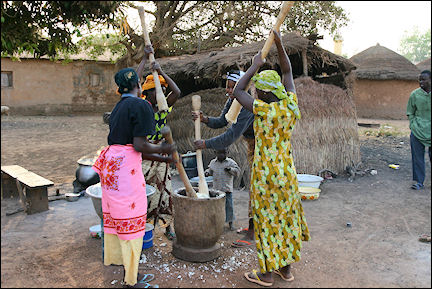
|
When we ask if there is a place where we can eat, the owner answers that she has food. She ladles large pieces of meat from a big soup pan. It is tasty. We have no idea what exactly it is, because it's dark. We eat the meat with our hands, Ghanese don't use utensils.
There is a piece that looks suspiciously like goat balls. We decide to switch on our flashlight. We guess that it's probably kidney. We can't leave it on our plates. The lady has done her utmost to fill our plates with meat. So we wrap the unidentified meat in an old newspaper and take it with us to the guesthouse.
Buipe - Kintampo - Techiman - Sunyami - Bekyem
The rooms of the guesthouse are also rented by the hour
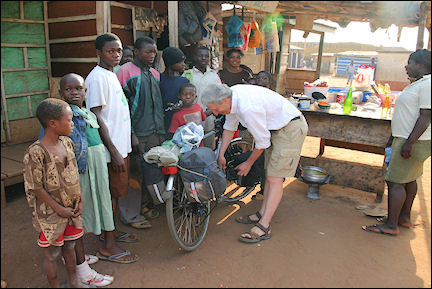
|
Next morning, the alarm wakes us again at 5 AM. It's Aart's birthay. The streamer we brought, with the original text "Happy birthday" looks festive in our room.
We're back in the rythm of our daily bike rides. Between Kintampo and Techiman a pedal breaks. After some cracking and creaking it just falls apart. Fortunately, we're not far from a somewhat bigger village with a bike-repair shop.
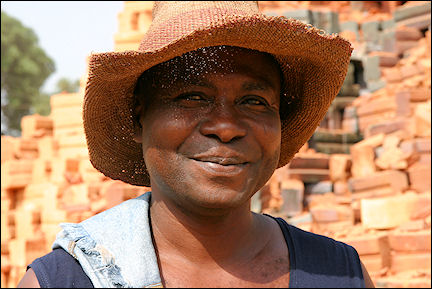
|
Via Techiman we ride to Sunyami and then to Bekyem. Quiet roads with wonderful views. We visit a cocoa finishing plant, where we are told about the cultivation of cocoa, which is Ghana's economically most important agricultural product.
At a brickyard, the owner proudly shows us a brick press he made himself. When we ask to what temperature the oven is heated, he answers that this is done by instinct.
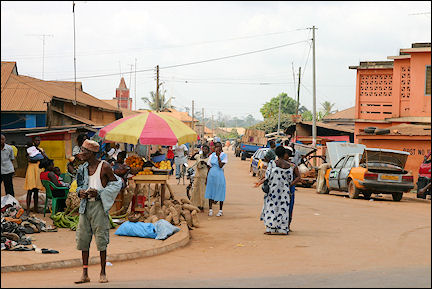
|
Bekyem is a small town which luckily has a guesthouse. It's a little shabby, but for the 3.5 Euro they charge, we can't expect too much. After we have brought our stuff into our room, we find out that the rooms are also rented by the hour.
Many people in the village use this facility. And not to play scrabble. The uneasy feeling we have about this, disappears when we go into the village in the evening to have a drink.
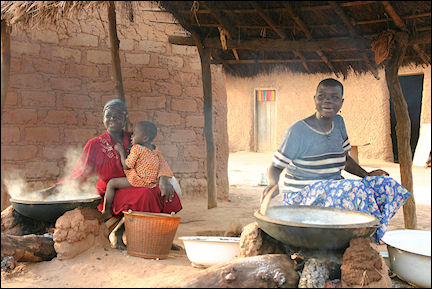
|
We grab two chairs at the local bar and take them outside to watch the crowds. With beers in our hands, we see the vendors at the market work, we see used Dutch cars with texts like "Cafetaria de Smulpaap voor al uw snacks" ("Fastfood restaurant The Gourmet for all your snacks") drive by.
We wave at the uniformed schoolchildren who pass by. The Dr. Livingstone feeling, as it were. The setting sun makes the building at the other side of the market, with it pastel colors, seem even brighter.
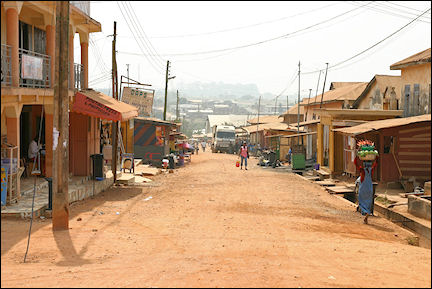
|
We pick up food at a stall: fried slices of yam, call them Ghanese fries, with barbecued parts of an unidentified animal. The owner of the bar brings us, we didn't even have to ask, a bowl of water and a cloth to clean our finger, with which we eat, for lack of utensils.
After a conversation with the headmaster of the local primary school, we walk down the dark sandpath to our guesthouse. Because, also in Ghana, most adultery takes place in the daytime, it's wonderfully quiet when we lay ourselves down on the three centimeters thick mattress on a lathing with just a little too few slats. Only the bellowing of the minister in the nearby Praise and Healing church keeps us awake for a short while.
Bekyem - Kumasi
A market with over ten thousend stalls
After six days and 460 km of bicycling in a gorgeous area, we reach Kumasi, the economic center of the country. For now, no more fufu and fried corn balls, but a tasty pizza.
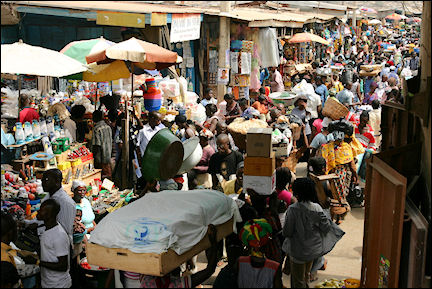
|
Just like in large parts of the countryside, people use taxis for transportation in Kumasi. The result is that traffic in the city center is completely jammed. With our bicycles, that doesn't affect us. When we explore the city, we manoeuvre between the cars.
The highlight of Kumasi is the market: over ten thousand stalls and other vending places in a maze of alleys and streets with a total surface of 12 hectares. Hundreds of stalls where shoes are made, hundreds where tablecloths are embroidered, where second hand clothes and fridges are sold and where dried meat and herbs are offered.
It's a cheerful place. Everyone feels like talking. When we speak with one of the shoemakers, 99 of his colleagues join in, in Twi, the language of the region.
We visit the cultural museum and find out more about the still existing traditional forms of government of several tribes, including a real king and local chiefs.
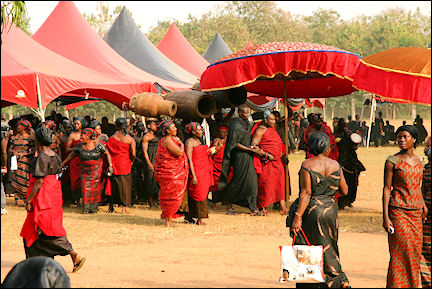
|
By the end of the afternoon we are witnesses of a burial ceremony for a local VIP, a former presidential candidate. Between a thousand and two thousand people in pretty black and red clothes gather around a meadow where the casket and photos of the deceased are displayed.
The local chief makes the rounds in full regalia, preceded by traditional drummers. The rest of what is happening, escapes us. It looks like "see and be seen" and shaking hands.
We stand on the edge of the meadow, together with other on-lookers. The deceased's cousin walks up to us, shakes our hands and invites us to join him. But we feel that would be inappropriate, as we're wearing shorts. Take pictures, walk onto the meadow, he suggests as an alternative. But we confine ourselves to taking pictures from the edge and watching the spectacle in amazement.
Kumasi - Obuasi
Around the gold mines, gold is mined illegally
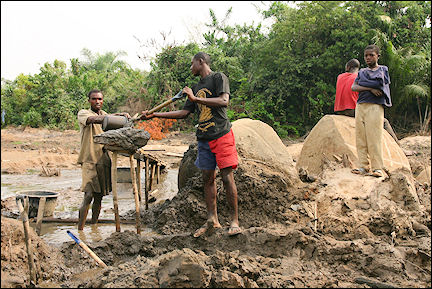
|
We resume our journey to the south early next day. Obuasi is our destination for today. On the way, kids are doing something we don't understand in the mud. It turns out to be illegal gold mining.
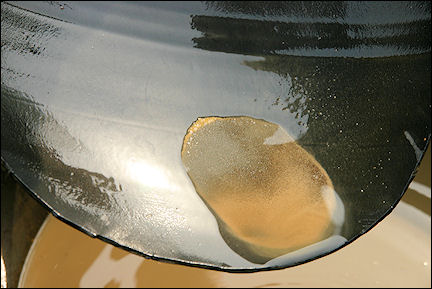
|
They proudly demonstrate their method. They mix soil with water, lead it through a gutter, where the gold dust remains at the bottom, while the soil is rinsed off. The gold dust and the remaining soil are then seperated in many stages, and eventually a very small quantity of gold dust remains.
A little farther it is done a little more professionally - and even more illegally - by extracting the gold with mercury. Not great for the environment or for their health.
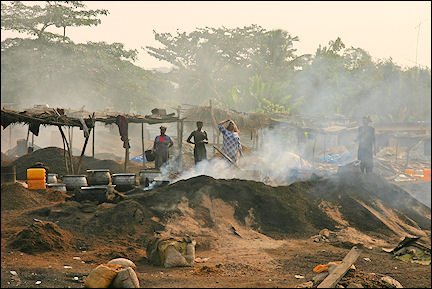
|
On our way we visit also other enterprises. A plant where oil is pressed from palm-oil fruits and which produces alcohol in Ghanese manner. Oildrums, fire and fermented palm-oil kernels are the ingredients.
We also take a look at the drying of cocoa beans. Everywhere people show us their work with obvious pleasure and - if anyone speaks English - we get an explanation of what it is they're doing.
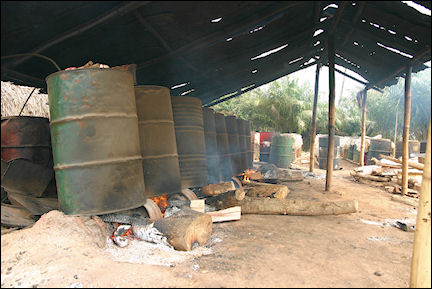
|
Obuasi is the location of the Anglogold Ashanti gold mines. We get a miner's lamp and an emergency ration of oxygen and an employee shows us how gold ore is mined. We also are allowed to see the installation wich extracts the gold from the ore.
Aart's visit to the hairdresser's is not really a success, but at least he knows now what goes on in a ladies' hair salon. Washing, sitting under the dryer, a little something from a jar, a spray can, but no cutting. Urged by Aart, the hairdresser finally begins to cut. After the first few moves of the scissors, it's allready clear that this will go nowhere. She doesn't specialize in cutting white men's hair. His hair looks like a mountainscape.
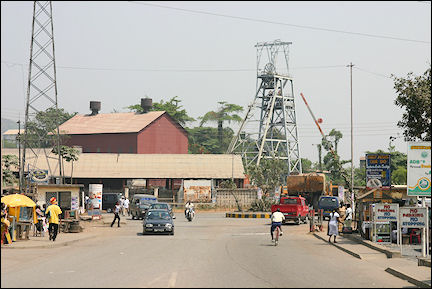
|
Interventions and directions by Gerrie don't help. It is and remains a disaster. A little desperate, we decide to leave it at this. The owner of the salon doesn't like the result either and doesn't charge us. We still give some money for the work.
In any case, his hair smells good. In the next town a barber performs a restoration for 50 cents.
Obuasi - Dunkwa - Bogosa - Tarkwa - Butre
Here and there a giant tree still reminds of the jungle
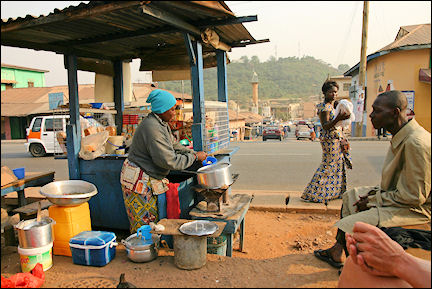
|
Via Dunkwa and Bogosa where we spend a night, we bicycle to Tarkwa. We almost always have breakfast at a stall or at a bus station, where they serve coffee and bread with fried eggs.
It's a beautiful route: hilly, here and there a remaining giant tree still reminds of the original forest and for the rest it's wilderness and small-scale farms and plantations. Cocoa is the most important crop here.
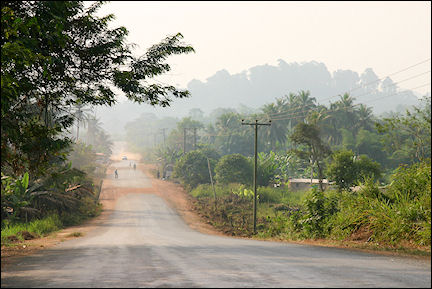
|
In comparison to the north this is a relatively wealthy region: a lot more economic activity, better infrastructure and apparently less extreme poverty. In terms of friendliness there is no difference. When we pass by villages, we are greeted with the same "You're welcome" and "obronie" as in other parts of the country.
When we arrive at the coast, we bicycle to Butre, a remote fishers village at the foot of a hill on which the remains of Fort Batenstein sit. This fortress was built in 1656 by the Dutch as a trading post.
There are many of these fortresses along the coast of Ghana, built by the Portuguese and later by the English, Dutch and Danes.
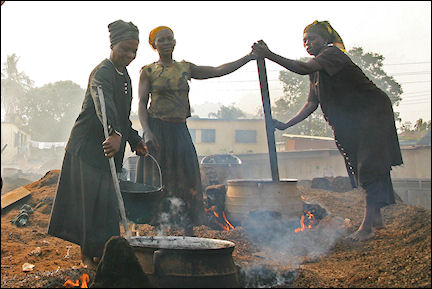
|
Originally the interest was in trading ivory and gold. It was called Gold Coast, as Ghana was called before its independence, for a reason. Later the slave trade became the most important activity.
In Butre we stay in the only tourist resort. The Hideout Lodge has five cabins in a park with shrubs and trees. It's located by a wonderful sand beach. This Saturday, reading and swimming are our main activities.
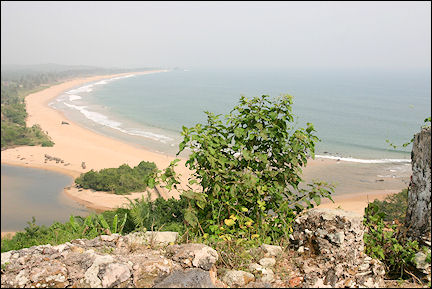
|
Early Sunday morning someone from Butre takes us to a laguna in a hollowed-out tree trunk for a crocodile tour. We see a lot, but no crocodiles. The answer to our question when the last time was that a crocodile was spotted, is vague enough for us to think that it was probably a long time ago.
Later that morning, Gerrie attends the service in the local church. It is a lively, but also lengthy happening. When the pastor preaches, he walks up the aisle and mainly addresses the women who, appropriately separated from the men, sit on the right side of the church. It makes me curious about what the pastor is telling them. He preaches in the local language, so I don't understand.
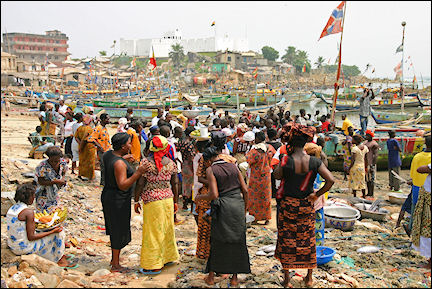
|
After two hours it's time for the offertory. Preceded by the choir, who are dressed in robes and graduation caps, everyone walks up to the washing-up bowl that serves as a collection dish in a long line, dancing and singing. A good opportunity to head for the exit after passing the collection dish.
Meanwhile, Aart bicycles to Dixcove, in a straight line only 5 km from Butre. On the road, the distance is 15 km, however. Sunday doesn't exist here. The fishing boats take their catches ashore, display them on the beach, where they are sold and processed. Barracudas, measuring 1.5 to 2 meters, are chopped into pieces of a kilo each. The vultures wait patiently until they can devour the leftovers from the slaughter.
Butre - Shama - Cape Coast
Via fortresses on the coast, a million slaves were deported
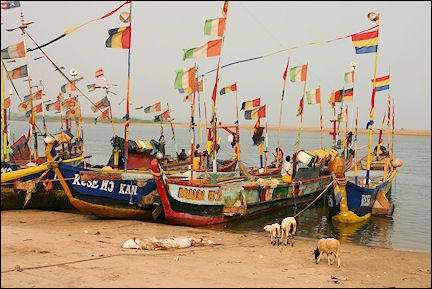
|
Early next morning we load our luggage on our bicycles. We want to cover the 200-250 km distance to Accra in four stages. In Shama, were we spend the first night, the whole village goes nuts when Ghana wins a soccer game against Morocco and thus qualifies for the quarter finals of the Africa Cup.
There is a band with trumpets and drums, a crowd of Ghanese dance, it's very lively. As the only whites in the village, we have to join the dancing. We probably lack the right moves, but it's fun to do.
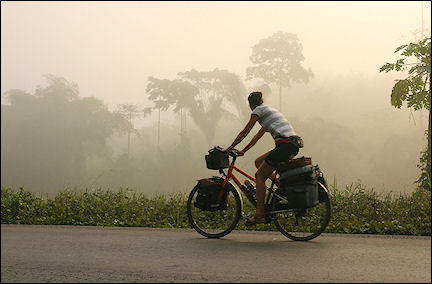
|
Next day our destination is Cape Coast: one of the touristic highlights of Ghana, because of the Cape Coast Castle which the Portuguese built here in the 15th century. Later, it was conquered by the British and now, beautifully restored, it is on the Unesco World Heritage list.
It is far from heavily touristic. The town is still authentically African and the whites can be counted on the fingers of one hand.
The castle is impressive: its location and size, but mostly its history of slave trade, which is visible in its slave dungeons. Thousands of male slaves were locked up without any sanitary amenities, in a dank space of 800 square meters, waiting to be deported to America or the Caribbean.
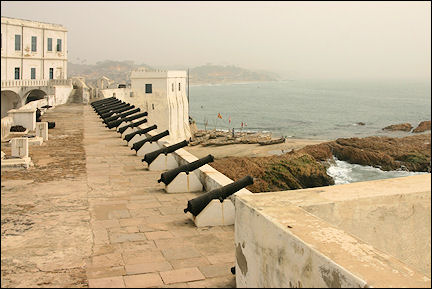
|
Light and air enter only through a few small holes. The women were kept in a separate dungeon. An estimated million slaves (on a total of 10-15 million slaves) were deported from their homelands via the fortresses in Ghana.
The museum next to the castle gives a clear impression of the slave trade. It's remarkable that the Ghanese don't exclude themselves from blame. Ghanese were themselves involved in the slave trade: slaves were traded for alcohol, weapons and tobacco. The role of the Europeans is put into perspective by accentuating the positive effects of the European presence, like education and the introduction of products like cocoa.
Cape Coast - Accra
While the women trudge, the men sit on a bench
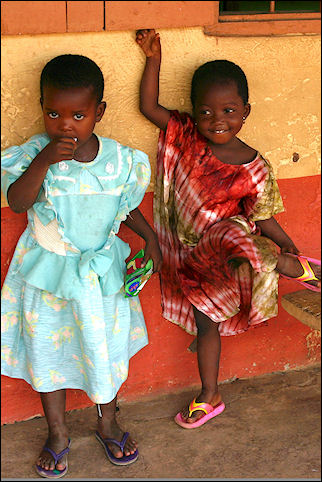
|
There are two more stages to Accra, which are hard because of a strong head wind and - mainly on the last day - busy traffic. Nothing to be done about it.
We have so many impressions. The enormous contrasts in Ghana. The extreme poverty in the north. The south and center of the country are more fertile and wealthier: everything is lush and green, there is a lot of agriculture and in villages the stores carry more than just some flour and laundry detergent.
And there is the inequality between men and women, especially in rural areas. One time, Gerrie couldn't take it anymore when she saw boys and men sitting on a bench in the early morning, while the women were carrying incredible loads of wood on their heads. Brake, get off the bike and preach. It's dubious if these men will change their centuries-old gender roles because of this, but it is a great relief to say it.
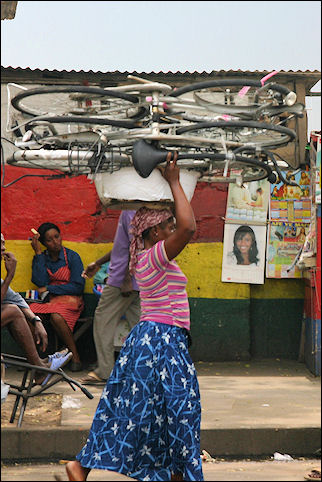
|
What we have learned over the last few weeks, is that a head can be used for so much more than thinking. Bananas, sewing machines, display cases, dishes with live chickens, tens of liters of water, fire wood, candy, schoolbags: everything is carried on the head.
But what we will always remember, is the uncomplicated friendliness of the people. Ghanese who live in our own country must feel so uprooted in this respect. Here, people greet us friendly, they come and sit with us to talk. We haven't felt unsafe or uncomfortable for a moment. Ghana is litterally and metaphorically a warm country.